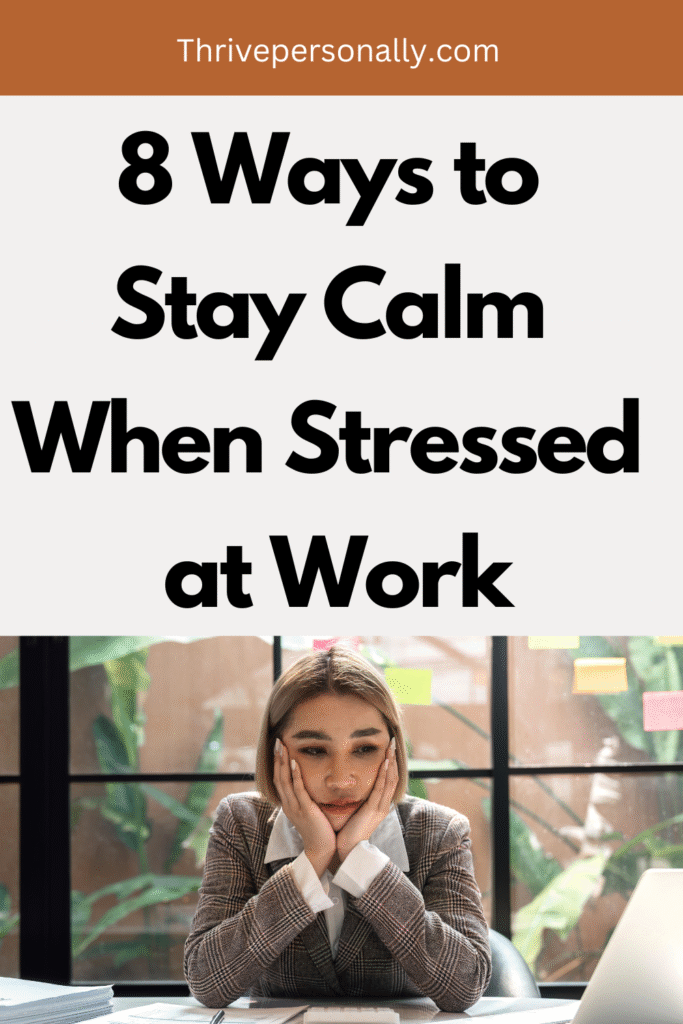Work is a large part of life for most people. You’re in front of a screen for hours, replying to emails, meeting deadlines, solving problems, and trying to stay on track. Maybe it’s a job you love—or just something to pay the bills. Either way, work comes with pressure. Sometimes, that pressure can feel like too much.
Stress at work builds up fast. It might begin with a few long days. Then comes poor sleep. Your mood shifts. You feel tired or even sick. And once your mind gets stuck in the loop of stress, it’s hard to break free.
You don’t have to stay trapped in that cycle. While stress won’t disappear completely, you can build habits to help you stay calm and steady, even when the job gets tough.
Why Work Stress Hits So Hard
At work, a lot is expected of you. You have schedules, meetings, tasks, and people counting on you. Your boss may expect more. Your coworkers rely on you. Or maybe you’re self-employed—and it’s all on you.
What makes work stress harder than other types is that you can’t always walk away from it. You can’t pause when you want. You might not be able to say no. You may worry about losing your job if you don’t push through.
That’s what makes work stress feel like a trap. Your brain sees it as danger, and your body reacts.
Read also: How to Calm Stress in Just 3 Minutes
How to Stay Calm When Stressed at Work
1. Start Your Day with Stillness
Take a few quiet minutes before checking your email or talking to anyone. This helps you begin the day with focus instead of stress. Just sitting still and breathing for one minute can set a calm tone.
Studies from Harvard Health show that deep breathing lowers stress hormones and boosts focus.
Read also: 15 Signs You Need a Mental Break
2. Focus on One Task at a Time
Multitasking might seem smart, but it makes stress worse. Your brain isn’t built to switch quickly between tasks. It uses more energy and causes more tension.
Instead, try working on one thing at a time. Write down your to-dos so they don’t stay in your head.
Doing one task may feel slower—but you’ll finish more and feel less pressure.
Read also: 16 Fun Ways to Take a Mental Break from Life
3. Pause and Breathe During the Day
When stress starts rising, stop for a minute and breathe. Inhale through your nose, hold, and exhale slowly through your mouth. Repeat a few times.
This tells your brain everything’s okay. You don’t need to run—you just need a moment. You can do this at your desk. Breathing gives your mind space.
4. Protect Your Boundaries
One reason work feels endless is because it often is. People might message you after hours or expect you to stay late.
Protect your time. That might mean turning off work notifications after a certain hour. Or simply saying, “I can’t take more right now.”
Burnout doesn’t help anyone. Peace comes from knowing when to step back.
5. Speak Kindly to Yourself
When stress piles up, your thoughts can turn harsh: “I’m behind,” “I can’t do this,” or “I’m failing.”
Try changing that voice. Say: “I’m doing my best,” or “This won’t last forever.” Your brain hears your words.
Being kind to yourself doesn’t mean slacking—it means helping your brain work better, not harder.
Read also: 100 Affirmations for Calmness
6. Move, Even a Little
Stress doesn’t just live in your mind—it lives in your body. Sitting too long makes it worse. Stretch, walk during lunch, or stand for a few minutes.
Even small movements help release tension. When your body feels lighter, your mind follows.
7. Create a Calming Work Space
Your environment affects how you feel. A cluttered or noisy space adds stress. Try to keep your desk neat and simple. Add something calming—a small plant, a favorite photo.
These little touches act like anchors. When things feel chaotic, they remind you that peace is close.
8. Know When to Ask for Help
You don’t have to do it all alone. Talk to your manager or a teammate if you’re overwhelmed. If stress affects your health, speak to a coach or a mental health expert.
Many workplaces now offer counseling or wellness programs. The American Psychological Association recommends early support to prevent long-term issues.
Asking for help isn’t weakness—it’s wisdom. It means you care enough to take action.
Why Calm Workers Do Better
Staying calm isn’t just about feeling good—it makes you a better worker. When you’re relaxed, you can:
-
Think more clearly
-
Handle pressure better
-
Speak with confidence
-
Make fewer mistakes
-
Enjoy your work more
Stress doesn’t make you productive. It just makes you rush. Calm helps you focus on what matters—and ignore what doesn’t.
You don’t have to be perfect to be effective. You just have to be present and steady.
What to Do When It’s Too Much
Sometimes, the stress isn’t about habits—it’s about the job itself. If you’ve tried everything and still feel overwhelmed, it may be time to make a bigger change.
That doesn’t always mean quitting. It could mean changing roles, talking to HR, or finding a new way to work that protects your peace.
You deserve to feel safe and respected at work. If your job doesn’t allow that, think about what’s best for your well-being.
Choosing yourself is not shameful—it’s strong.
Final Thoughts
It’s not always easy to stay calm at work when stress is high. But it is possible. You don’t need a vacation or a dream job. You just need small habits that remind your brain and body how to reset.
Breathe. Focus. Speak gently to yourself. Move. Set boundaries. Ask for help.
These habits help you pull back from stress and find space to think, act, and feel like yourself again.
Work doesn’t have to break you. You can show up steady, focused, and strong—no matter what the day throws your way.
Save the pin for later



